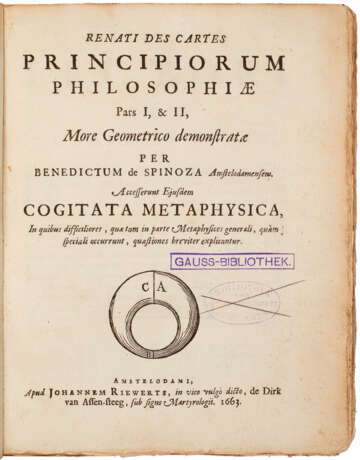ID 1236269
Lot 39 | Principiorum Philosophiae, Gauss's copy
Valeur estimée
$ 30 000 – 50 000
The Prince of Mathematicians studies Philosophy—a teenage Gauss reads Spinoza. Although Gauss is well-known for his work in mathematics, astronomy and physics, he is said to have “possessed and studied carefully the works of Hume, Francis Bacon, Kant, Christian Wolff, Fries, Descartes, John Locke, and Malebranche” (Dunnington, Carl Friedrich Gauss: Titan of Science, 1955, p. 313). As this list suggests, Gauss preferred a philosophy that blended some positivism and empirical science with its metaphysic, and there is much in Spinoza’s book to draw the attention of young Gauss. Spinoza’s only lifetime published work, Principia philosophiae cartesianae is a reconstruction of Descartes’ Principles of Philosophy, unfolded after the manner of a geometrician (more geometrico demonstrata); and the 1794 dating of Gauss’ inscription indicates that he acquired this book at the age of 17, one year before he went to university. Spinoza’s treatise summarizes both Descartes’ metaphysics and his physics; and after first presenting Descartes’ theory of God and knowledge, Spinoza devotes equal time to the articulation of Descartes concept of space and his laws of motion, including his views on the divisibility and shape of matter – topics of critical importance to a young empirically-minded mathematician seeking his philosophic ground. Stylistically speaking, one would be hard pressed to name a philosopher whom Gauss might find more appealing than Spinoza, who is world-famous for his geometric method of deductive reasoning; and as the founder of modern western philosophy—and, perhaps even more significantly, as the inventor of analytic geometry (and Cartesian coordinates)—Descartes ranks high on the list of philosopher-scientists whose worldview Gauss might like to better understand. Though we do not know what precisely drew Gauss to Spinoza’s treatise, it is intriguing to conjecture that Gauss perhaps sought to gain an insight into the workings of Descartes’ mathematical mind. Indeed some 34 years after he acquired Spinoza’s treatise, we still find Gauss wrestling with Descartes’ mathematics—Gauss in 1828 venturing the first viable proof for Descartes’ “Rule of Signs,” a technique for finding the real positive roots of a polynomial. Gauss is considered the greatest mathematician of the modern era (thus his epithet as “The Prince of Mathematicians”). Among Gauss’ many achievements, he is perhaps most famous for framing (in 1799) “the fundamental theorem of algebra,” a method for finding the complex roots of a polynomial; and indeed Gauss’ continued interest in the roots of polynomial equations can be said the common thread of his illustrious career. A most remarkable association copy bringing together three of the greatest geometric minds that ever lived.
Quarto (212 x 161mm). Woodcut diagrams in text, untrimmed with deckled edges (faint dampstain at lower blank margins on A3 and from M4 to end). Contemporary paper boards with spine lettered in ink (mild chipping along spine folds and scattered light foxing). Provenance: Carl Gauss (ownership signature ("Gauss 1794") on blank leaf – Gauss-Bibliotek, Göttington (label on upper cover, stamps on title page, and front pastedown, the latter noting deaccession on 14 October 1951).
| Artiste: | Benedictus de Spinoza (1632 - 1677) Carl Friedrich Gauss (1777 - 1855) |
|---|---|
| Lieu d'origine: | Allemagne |
| Catégorie maison de vente aux enchères: | Médecine et sciences, Livres |
| Artiste: | Benedictus de Spinoza (1632 - 1677) Carl Friedrich Gauss (1777 - 1855) |
|---|---|
| Lieu d'origine: | Allemagne |
| Catégorie maison de vente aux enchères: | Médecine et sciences, Livres |
| Adresse de l'enchère |
CHRISTIE'S 8 King Street, St. James's SW1Y 6QT London Royaume-Uni | |
|---|---|---|
| Aperçu |
| |
| Téléphone | +44 (0)20 7839 9060 | |
| Commission | see on Website | |
| Conditions d'utilisation | Conditions d'utilisation |






